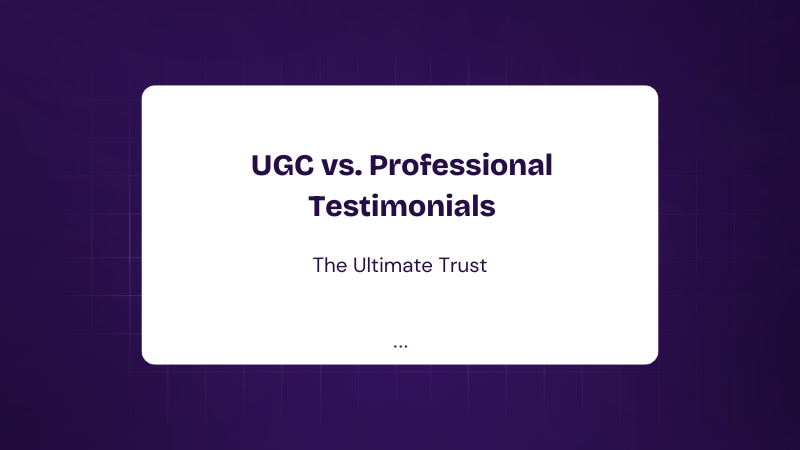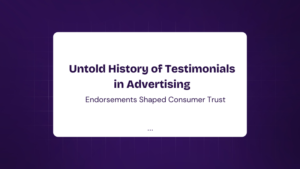The Ultimate Showdown—Raw Truth or Polished Perfection?
Imagine this: You’re scrolling through Instagram, debating whether to buy that fancy skincare product everyone’s raving about. You see a sleek, high-budget ad featuring a flawless model delivering a scripted testimonial. Next, you stumble upon a regular person—maybe someone like you—excitedly sharing their honest experience through a grainy, unfiltered video.
Which one do you trust more?
In the ever-evolving world of digital marketing, User-Generated Content (UGC) and professional testimonials are in a constant tug-of-war for consumer trust. One thrives on authenticity, the other on authority. But when it comes to influencing purchase decisions, which one truly wins? Let’s dive into the research, stats, and expert opinions to settle this debate once and for all.
Understanding UGC and Professional Testimonials
What is User-Generated Content (UGC)?
User-Generated Content (UGC) refers to any form of content—videos, images, reviews, testimonials—created by everyday consumers rather than brands. It’s organic, relatable, and often unfiltered.
Examples of UGC in Action:
- A customer posting an unboxing video of your product on TikTok.
- A beauty influencer sharing a candid review of your skincare line.
- A traveler documenting their hotel stay through Instagram stories.
What Are Professional Testimonials?
On the flip side, professional testimonials are polished, brand-approved endorsements. These often involve paid actors, influencers, or even real customers filmed under carefully controlled conditions.
Examples of Professional Testimonials:
- A scripted customer success story in a brand’s marketing video.
- A celebrity endorsement filmed with high production value.
- A case study showcasing a brand’s impact on a business.
Both approaches serve a purpose, but which one influences buyer decisions more effectively? Let’s break it down.
The Psychology Behind Trust: Why Do People Believe What They See?
Authenticity vs. Authority: A Psychological Perspective
Trust is the foundation of consumer decisions, but how it’s built depends on perceived authenticity vs. perceived authority.
- Authenticity (UGC): People trust content that feels raw, unscripted, and emotionally genuine. Studies show that 90% of consumers say authenticity is a key factor in deciding which brands they support.
- Authority (Professional Testimonials): When people see a well-produced testimonial featuring an expert, they associate it with credibility and reliability. This is why celebrity endorsements and case studies are still powerful marketing tools.
Numbers Don’t Lie: The Trust Factor
- According to a Stackla study, 79% of people say UGC highly impacts their purchasing decisions, compared to only 13% for brand-created content.
- A Nielsen report found that 92% of consumers trust peer recommendations more than traditional advertising.
- Meanwhile, a BrightLocal study states that 48% of consumers still trust professionally produced testimonials, especially in industries like healthcare and finance.
So, while UGC dominates in authenticity, professional testimonials still hold weight where authority matters.
The Power of User-Generated Video: A Game-Changer in Marketing
Why UGC Videos Convert Better
User-generated video has exploded in popularity thanks to platforms like TikTok, Instagram Reels, and YouTube Shorts. But what makes them so effective?
- They feel real: Unlike brand-produced content, UGC videos don’t have the “salesy” vibe.
- They’re relatable: Seeing an average person use a product makes potential buyers think, “That could be me!”
- They encourage engagement: UGC videos often get higher engagement rates than professional ads.
Case Study: How UGC Helped GoPro Dominate the Market
GoPro’s entire marketing strategy revolves around user-generated videos. Instead of creating high-budget ads, they encourage users to share their own adventure clips using GoPro cameras. The result? A 400% increase in engagement compared to traditional promotional content.
Where Professional Testimonials Shine
While UGC is great for engagement, professional testimonials excel in high-stakes industries where credibility is king.
Industries Where Professional Testimonials Work Best:
- Healthcare: A patient’s recovery story needs medical backing.
- Finance: Trusting a bank requires polished, well-verified testimonials.
- Luxury Brands: High-end products demand an air of sophistication.
Example: Apple’s Mastery of Professional Testimonials
Apple blends professional storytelling with real customer experiences. Their polished ads featuring everyday users still feel authentic, proving that a hybrid approach can be the secret weapon.
The Verdict: UGC vs. Professional Testimonials – Which Wins?
So, which one is better? It depends on your goal.
| Factor | UGC Wins | Professional Testimonials Win |
|---|---|---|
| Authenticity | ✅ | ❌ |
| Engagement | ✅ | ❌ |
| Brand Control | ❌ | ✅ |
| Trust in High-Stakes Decisions | ❌ | ✅ |
| Scalability | ✅ | ❌ |
The Best Approach? Use Both!
Smart brands don’t pick sides—they combine UGC and professional testimonials to build trust at multiple touchpoints.
- Top-of-Funnel (Awareness) → UGC to engage and build authenticity.
- Middle-of-Funnel (Consideration) → A mix of UGC and expert testimonials.
- Bottom-of-Funnel (Conversion) → Professional testimonials for credibility.
FAQs
Is UGC more effective than professional testimonials?
Yes, in terms of engagement and authenticity. However, professional testimonials still hold weight in credibility-driven industries.
Can brands control UGC?
Not entirely, but brands can encourage high-quality UGC through incentives, contests, and influencer collaborations.
Do professional testimonials still work?
Absolutely. They are crucial for industries that require trust, like finance, healthcare, and technology.
How can brands use both UGC and professional testimonials effectively?
By using UGC for engagement and professional testimonials for credibility, brands can build a comprehensive trust strategy.
What’s an example of a brand using both approaches?
Nike does this exceptionally well, blending raw user-generated content with high-production athlete testimonials.
Which type of content converts better?
UGC often leads to higher engagement and conversions, but professional testimonials work better for high-value purchases.
The Perfect Blend Wins the Trust Battle
So, in the battle of UGC vs. Professional Testimonials, there’s no absolute winner. The real power lies in combining both—leveraging UGC’s authenticity and professional testimonials’ credibility.
For brands looking to build lasting trust, the answer isn’t choosing one over the other. It’s about finding the perfect balance between raw, real content and polished, persuasive storytelling.



